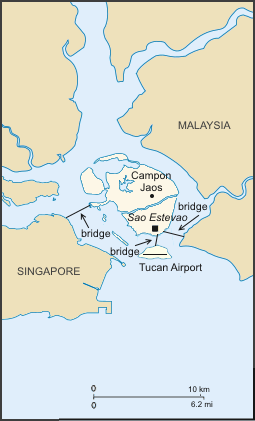Tucan
Tucan / Tukang توكڠ | |||||||
|---|---|---|---|---|---|---|---|
The Free Port of Tucan
| |||||||
 Location of Tucan (red) | |||||||
| Sovereign state | Singapore | ||||||
| Portugese trading post | 1614 | ||||||
| Johor Treaty | 1814 | ||||||
| Transitionary Period | 1975 | ||||||
| Autonomy as self-governing territory of Singapore | 22 February 1987 | ||||||
| Capital and largest city | Sao Estevao | ||||||
| Official languages | Malay Portuguese | ||||||
| Ethnic groups (2011) | 62.4% Malay 17.6% Portuguese 12.2% Chinese 5.6% Indian 2.8% other | ||||||
| Demonym(s) | Tucanese | ||||||
| Government | Mixed government | ||||||
| Anabela Pereria Chan | |||||||
| Mudhàffar Mahmad | |||||||
| Legislature | Legislative Council | ||||||
| Population | |||||||
• 2011 census | 62,378 | ||||||
| GDP (PPP) | 2014 estimate | ||||||
• Total | $3.628 billion | ||||||
• Per capita | $58,165 | ||||||
| Gini (2019) | 0.48 low | ||||||
| HDI (2020) | very high | ||||||
| Currency | Tucanese pataca (TCP) | ||||||
| Time zone | UTC+8 | ||||||
| Date format | dd/mm/yyyy | ||||||
| Driving side | left | ||||||
| Calling code | +65 | ||||||
| ISO 3166 code | .tc | ||||||
| Internet TLD | .tc | ||||||
Tucan, also spelled Tukang (Malay: توكڠ, Tukang), and officially the Free Port of Tucan is a city and self-governing territory on the end of the Malay Peninsula in Southeast Asia. The city-state borders Malaysia to the north and Singapore to the east and west. Tucan is one of the smallest territories in the world both by land area and population, with an area of a mere 24.43 km2 (9.43 sq mi) and a population of 62,378.
Tucan was formerly a colony of the Portuguese Empire, establishing a trading post on the island in 1614 after a brief altercation with the Johor Sultanate. In 1814, Portugal and the United Kingdom signed the Johor Treaty defining the borders between Portugese and British holdings in Malaya. As per the agreement, Portugal would continue to administer Tucan. The colony remained under Portugese rule until the 1974 Carnation Revolution in mainland Portugal. The newly-formed Portuguese government held a stance of decolonization and thus the territory was placed into a 12-year transitionary period to prepare it for independence.

